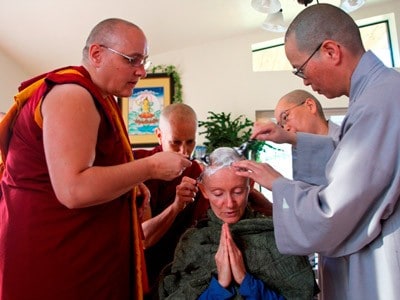A dialogue about ordination

Recently one of the Abbey residents who is considering ordination asked a good friend who had ordained a few years ago some questions. The following is the communication they had that may prove beneficial to others also considering ordaining.
I would like to get a dialogue going on some of the things that one gives up when one ordains. Which ones did you find especially difficult and which ones were surprisingly easy?
What do you give up when you ordain? A lot! Your identity, your independence, your privacy, many of your precious needs, hopefully your self-cherishing. This also depends on where you live and who’s guiding you. Venerable is pretty strict but there is benefit in that. What do you gain? A lot! Learning to know what makes life meaningful, learning to discipline the mind, learning to love equanimously, learning to let go of “my needs, my happiness” as most important, etc.
I have questions about friendships and family relationships. How have they changed (your opportunities to visit, call, and see them). I am trying to see what is attachment and what is a lot of good hard work on both sides of my friendships that I would hate to lose. Maybe one doesn’t give them up, but extends the circle to encompass a larger group of people.
It sounds like you think happiness comes from friendships. Yes, we all need love to flourish, but in the past few years I have realized that happiness comes from my mind, not from others. Friendships may be the condition that allows seeds of happiness to ripen, but they are not the substantial cause of that happiness. Often friendships shore up a sense of identity, but as we grow in the Dharma, more of that identity comes from realizing our true nature and our potential. When the goal becomes more focused on achieving a good rebirth, liberation, and enlightenment, our friendships naturally change of their own accord, similar to when you stop drinking, you naturally stop associating so much with drinkers and going to parties. This doesn’t mean that we cut off friendships altogether, but the sangha really becomes more of your family and more of your arena for growing, learning, and reflection. The more I surrender to this, the happier I am. Every person can be that friend. And our own loneliness is a great tool to learn from! Yes, we work to extend the circle of people who are friends. His Holiness the Dalai Lama says that he tries to see every person he meets as an old friend. That comes from working with our mind and not so much with making sure we’re surrounded by people we naturally like.
Looking back, would you have done anything differently? When did you really start contemplating ordination? And when you decided to ordain, how did your process actually unfold time-wise?
In hindsight, I wish I had understood the Dharma better before I ordained. But even as naive as I was, I’m also glad that I ordained when I did and have had the opportunity to study. I know more clearly than ever that Dharma is about transforming our own mind into an enlightened mind. I didn’t really understand that before I left for India. I didn’t really know about the mind and its process of transformation. I didn’t see the bigger picture very clearly, but I just jumped.
Do you have any suggestions as to reading material? I am reading Venerable’s booklet Preparing for Ordination for Westerners, which has a lot of good questions to ask myself, so that will help.
The questions in Venerable Chodron’s booklet are very helpful. I answered them a couple of times, and I could have kept going, looking more deeply into motivation, expectations, etc.
You might find some reflection/meditation in these areas helpful:
- What is happiness? (Big question!) What are the causes of greater happiness and satisfaction? (Hint: positive states of mind that drive virtuous acts of body, speech, and mind.) How am I creating their causes now? Since everything I do is an effort to create happiness (check it out—it’s true! Everything right down to choosing which socks to wear!), what will support me to create more genuine causes of happiness for myself and others? Is it possible to exist in a state without any suffering (free of cyclic existence)? Begin to imagine what that would be like.
- Has your family always been your family? What relationship did you have with your current sister in the life before this one? What relationship will you have with her next life? How many times has she been your mother, sister, lover, enemy? Can you lead her to enlightenment right now? Can you eliminate her suffering? What kind of love can you offer her now and what kind of love could you offer her in the long run if you devoted yourself to the Dharma?
- Of what benefit am I to others now? Realistically, how many people can I actually help as an ordinary sentient being? How could I be of utmost benefit to others? What causes do I need to create to bring that about?
- What is attachment? What is love? What is equanimity? What are the benefits of really trying to bring these about?
- What are your fears around ordaining? What do you think you will lose? What are you afraid of experiencing?
- What could shift inside you on its own accord, making the direction you want to take in the future clearer?
I can’t emphasize enough that meditating on the sufferings of cyclic existence is what begins to wake us up. All ordinary happiness is merely the suffering of change—it’s temporary, in the nature of suffering, impure, and without any inherent existence. Our basic nature is dissatisfaction. (Check it out. Know this for yourself.) How much chocolate or rhubarb pie can you eat before the pleasure disappears? How many kisses, hand holding, or orgasms would it take to really satisfy you completely? Or do we keep needing to get a new fix? How long could you spend with your friends before you’d be bored and ready to find a new friend?
One metaphor that sticks with me is thinking that we all need brain surgery, so I’m stepping away from relationships to study medicine and surgery so that I can one day be of greater and greater benefit to others. Right now, all I can do is hold their hand, and this does nothing to cure their brain tumor.
Hope something in there is helpful. Looking forward to a good chat.
Sravasti Abbey Monastics
The monastics of Sravasti Abbey endeavor to live generously through dedicating their lives to the Buddha's teachings, practicing them earnestly, and offering them to others. They live simply, as the Buddha did, and offer a model for society at large, showing that ethical discipline contributes to a morally grounded society. Through actively developing their own qualities of loving-kindness, compassion, and wisdom, the monastics aspire to make Sravasti Abbey a beacon for peace in our conflict-torn world. Learn more about monastic life here...


